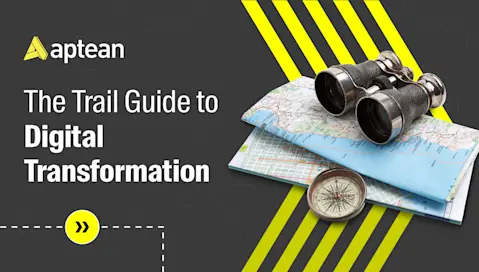Featured in this post
The Trail Guide to Digital Transformation: A Guide to Apparel Software
The Trail Guide to Digital Transformation: A Guide to Apparel Software
15 Sep 2022
Aptean Staff Writer
Jeff Bezos, CEO of Amazon, stated, “There is no alternative to digital transformation. Visionary companies will carve out new strategic options for themselves — those that don’t adapt, will fail.”
Jeff Bezos took Amazon from a small purveyor of books and CDs to one of the world’s largest retailers and one of the most valuable brands on the planet. And you know how he did it?
He did it by being at the forefront of innovation and technology. For those of you beginning a digital transformation journey, you’ll need the right tools and you’ll need a good team behind you to get to your destination.
Think about digital transformation like a hiker preparing for a new trail. You wouldn’t just grab a backpack and some sturdy shoes and show up ready to walk. Hikers will spend some time preparing for such a trek. And, just like that hiker, apparel companies must be prepared before they start on the path to digital transformation. However, the rewards are worth it—digitization of key processes can improve speed to market by 40%.
Before each new adventure, a successful hiker creates a packing list. This list will have requisite items to complete the journey; just like you will need special tools in your pack to complete your digital transformation. Yes, this trail hike is a metaphorical one, but it is an apt way of describing the path to come.
In the article below, we give you a roadmap to digital transformation, the tools you’ll need along the way and we’ll serve as your guide as you undertake the journey.
Cloud Apparel ERP
Industry-specific, cloud-based apparel ERP is the first step in your digital transformation journey. An apparel ERP is the building block solution that will serve as a “single source of truth” and will help you to streamline and automate most of your critical processes, such as inventory management and planning; vendor communications; and even warehouse management.
Apparel ERP software integrates key processes throughout the value chain in apparel manufacturing which improves the speed to market by streamlining operations and boosting process efficiency. Apparel ERP software, when paired with integrated, industry-specific components, gives your apparel company an accurate source of real-time data. This ensures that everyone from the designers to the manufacturer can make better decisions at every turn and is working with the same information.
Product Lifecycle Management (PLM)
Product lifecycle management, or PLM, refers to software that is designed to manage the product development process while giving everyone in the company a 360-degree view of each step. All information, from Bills of Materials (BOMs) to designer drawings to vendor notes, is accessible for everyone in one user-friendly, design-oriented platform. PLM for your apparel business serves as a tool for handling design and production data while facilitating communications with stakeholders so that everyone can complete pertinent tasks on time and without the need for countless emails or paper processes.
PLM solutions connect teams and improve communication. It ensures that pertinent information gets to all parties, and you can execute strategy quickly. Once you integrate your PLM software with your apparel ERP, you have the technology and tools to collaborate and share information and streamline the processes to design, develop, source and sell your product. PLM fosters innovation, manages information and speeds time to market. In fact, studies have found that incorporating a PLM system speeds time to market by 75%.
Electronic Data Interchange (EDI)
EDI, or electronic data interchange, is a crucial part of your digital transformation. EDI enables two companies to exchange information electronically about orders, invoices, inventory, product availability and more. It synchronizes the transfer of data between business partners, eliminating error-prone manual data entry.
Most major retailers require their business partners to have EDI before they will conduct business with them, so it’s an imperative tool in your digital transformation. EDI-facilitated sales accounted for 70% of all U.S. manufacturers sales last year, and those numbers are growing. Our industry-specific apparel ERP, Aptean Apparel ERP, includes EDI with the software, so you can seamlessly connect to your customers, vendors and financial institutions right at the outset. An EDI even allows you to track outside warehouses and 3PLs to make the supply chain more efficient. You’ll use EDI throughout every point along the value chain.
Vendor Portal
You already know that vendor communication and management is important, but if you don’t have the tools to keep track of vendor responses or product changes, you’ll slow down the process. A robust apparel ERP should have web-based vendor management tools to help you track product information, tech packs and shipment information in a central location—accessible to anyone from any device.
You get full visibility of work in progress (WIP); you’ll also get accurate, timely updates from contractors for both committed and consigned goods. You can integrate the vendor portal with your apparel ERP which gives your team better information about availability of sourced products. If there are sourcing issues, they’ll know quickly and can pivot and shift purchases to other suppliers. The portal facilitates purchase orders from their creation to final payment. In addition, the system allows you to track incoming shipment and container information. Even better, as your vendor uploads an invoice, the platform automatically feeds into the ERP for approval.
Shop Floor Control (SFC)
For fashion and soft goods manufacturers, you need full visibility into your manufacturing processes to keep promises to your customers, and you must deliver products on or before your customer’s timelines. Since sewing often involves manual processes, it’s imperative to keep track of labor productivity and performance, as that will directly impact your bottom line—and your reputation.
Effective workforce management is key to meeting customer expectations, but it’s hard to get there without full visibility into your manufacturing operations. The Shopfloor control (SFC) solution tracks the progress of production throughout your manufacturing operation.
Based on a scan-and-work system using tablets, SFC software gives you unparalleled plant floor visibility and control. Amongst the shop floor optimization benefits, you’ll maximize productivity, empower workers, and get a real-time, 360-degree overview of your operations. Your team gets real-time information and notifications regarding employee productivity, labor costs and pay rates. In addition, all information is projected on big screens overhead the shop floor so that everyone on the production line knows what’s going on. No more siloed teams in manufacturing and no more broken promises.
Reporting and Analytics
If your apparel ERP is the map to your digital transformation destination then the analytics and reporting tools are the GPS and compass. Robust reporting and analytics tools, built right into the apparel ERP, help you not only see where your business is going, but also guide your future business strategy to successfully get there.
An apparel ERP software, integrated with the automated tools mentioned above, will help your operations and processes run at peak efficiency. Production is moving along, your designs are done and you’re ready for the next stop on the trail.
With strategic insights and performance metrics now in hand, you can uncover trends and new opportunities empowering decision-making based on data as the business grows.
The Trail Guide for Apparel Companies: Let Aptean Show You the Way
Digital transformation is about incorporating technology into your business processes to help remain agile and future-proof your business. With these industry-specific technologies, you have the tools to make your apparel business better. More efficient. More profitable.
It takes a creative approach—something in which the fashion industry already excels. It’s about making the most of the resources you have and building on them. Digital transformation is a journey, but the tools fashion manufacturers need for a successful digital transformation are already available. Even better, these tools integrate seamlessly with one another, which allows you full control and visibility of all your business activities, from concept to consumer.
Now that your digital transformation packing list is complete, take the time you need to explore these digital tools at length. In our interactive Trail Guide to Digital Transformation, specifically created for the apparel industry, we give you a step-by-step path to digital transformation and the software tools you’ll need.
You don’t have to manage your digital transformation journey alone. Our team has more than four decades of experience in the fashion and apparel vertical, and our apparel ERP and integrated software solutions were designed with apparel companies like yours in mind. Aptean’s industry experts will act as your guide as you navigate the trail, helping you solve your unique challenges along the way.
Ready to find you how Aptean can help you along the transformation journey? Ask for a demo today.
Related Articles


Ready to transform your fashion and apparel business today?
If you’re ready to take the next step, we’d love to help.






